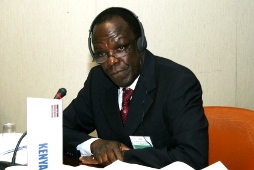ACP Ministers resist ‘unilateral deadline’ to wrap up EPAs
 Brussels, 10 December 2011/ ACP Newsdesk: Members of the ACP Council of Ministers stressed their commitment to finalising Economic Partnership Agreements (EPAs) with Europe, but staunchly oppose being rushed into free trade deals they say could be detrimental to the lives of their people.
Brussels, 10 December 2011/ ACP Newsdesk: Members of the ACP Council of Ministers stressed their commitment to finalising Economic Partnership Agreements (EPAs) with Europe, but staunchly oppose being rushed into free trade deals they say could be detrimental to the lives of their people.
Ambassadors and trade ministers from 79 member states in Africa, the Caribbean and the Pacific gathered in Brussels 7-9 December for the ACP Council of Ministers, which comprises the highest decision making body of the Group.
After hearing reports on EPA negotiations from the six economic blocks in the region – many of which remain in a virtual deadlock – several ministers insisted on more flexibility in the talks, while battling a bid by the European Commission to withdraw Market Access Regulation 1528/2007. This would require ACP countries to ratify their EPAs by January 1 2014, or lose duty and quote free access to European markets.
The Kenyan delegation said the move “was not in good faith” and places “undue pressure” on regions to ratify the deals.
“Instead of emphasis being placed on negotiating on substance… ACP countries [are pushed] into meeting their unilateral deadline which results in sub-optimal outcomes of the concerned regions…. We are committed to concluding a mutually beneficial agreement with EU but we should not be hurried unduly, but rather follow a mutually agreed road map of negotiation,” a delegate told the meeting.
“It is better not to have any deal than to have a bad deal,” added Zambian Minister for Trade and Commerce Bob Sichinga in speaking for the Eastern and Southern African (ESA) states.
“Being pushed up against a wall is unacceptable. It is better for us to engage and agree based on mutual interests. We may not achieve completely a win-win situation, but we can move from here. There is need for some flexibility on both sides.”
European partners have been hit by the global financial crisis, said Mr Sichinga but the struggling economies of the ACP region have suffered the same. However, he acknowledged the frustrating lack of progress on ESA EPAs over the last four years.
Out of the 36 ACP countries which have negotiated EPAs with Europe since 2007, only half have taken steps to ratify the agreement, including 14 members of the Caribbean economic block, along with Madagascar, Mauritius, Seychelles and Papua New Guinea. The remaining 18 have either initialled but not signed the agreement, or signed but have not satisfied the Commission’s required steps to ratify.
Impacts for these countries are varied. While nine Least Developed Countries will still benefit, for now, from the Everything But Arms (EBA) scheme (which allows duty and quota free access to LDCs), others will be forced to pay higher tariffs for their exports to Europe as part of the Generalised System of Preference (GSP). This includes low income or middle-low income countries such as Cameroon, Fiji, Ghana, Ivory Coast, Kenya, Swaziland and Zimbabwe. Meanwhile upper middle income Botswana and Namibia would have full levels of tariffs placed on their exports to the EU.
“The EU has been a valued trade and development partner for the ACP group over the years… [but also] needs to take into account the needs of all ACP countries that are negotiating a full EPA in good faith, and the harm to regional integration and small single commodity economies that this amendment will bring about,” stressed Fijian Permanent Secretary for Industry and Trade, Shaheen Ali.
Fiji faces an acute impact to its economy, with 75% of its exports to Europe – mostly sugar – potentially affected.
Meanwhile, spokesperson for the Southern African Development Community (SADC-EPA), Botswana Minister for Trade and Industry Dorcas Makgato-Malesu warned that the looming deadline threatens regional integration amongst the countries and joint efforts towards full EPAs, asmember countries are at different levels ofdevelopment and varied negotiation stages with the European Commmission.
ACP Trade Ministers called for solidarity amongst their members to work towards a “true partnership” with the EU. They meet with European counterparts on Monday afternoon 12 December for the annual Joint Trade Ministerial Meeting.
– ACP Newsdesk
